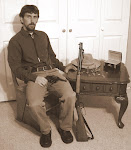Last night I finished Arrowsmith by Sinclair Lewis. I saw it on our downstairs bookshelf about a week ago and decided that I shouldn't let a classic book sit there unread - I wouldn't call it the most compelling read I've ever experienced, but it was worthy of my time. The use of language, the description of the characters, the development of the story, were all well done.
But I am left wondering what the author intended me to take from the story...I warn other people about asking themselves this question all the time, but I have asked myself anyway. It appears that the author wishes to enshrine asceticism above all else. I liked the main character (Martin Arrowsmith), because I could see some of myself in him, but I became very frustrated with him at several points in the story, especially at the end.
He is a bright and scientific young man from a small Midwest town who graduates medical school, goes briefly into small-town private practice, public health official for a time, and a more high paying private practice job before landing a medical research job with a large research firm. There is a fair amount of content in the book associated with Martin's former medical school mentor, Max Gottlieb, who is somewhat of an ascetic and purist. Halfway through the book, while working for the institute, Martin discovers a "phage" that destroys bacteria and he travels to a Caribbean island to fight an outbreak of plague.
Martin's wife Leora is a very likeable character - she is honest and has no pretensions and loves him through all of his quirks. She dies of the plague on the island, and he loses his anchor for a time. He remarries a very wealthy woman, but later leaves her and his young son to devote the rest of his life to pure scientific research.
I struggled a bit with the ending - this is where I see the author enshrining Martin's ascetic ideal, and I don't understand it. But overall, a good book.
Monday, December 14, 2009
Subscribe to:
Post Comments (Atom)

No comments:
Post a Comment